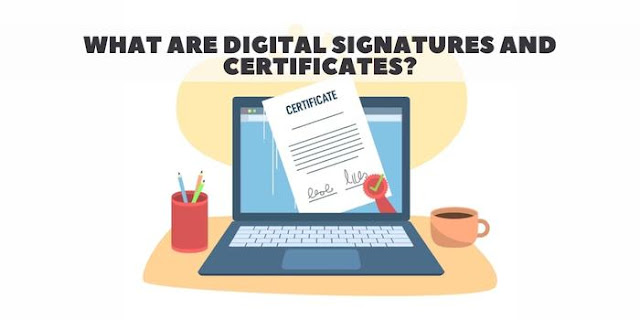What Are Digital Signatures And Certificates?
In the era of digital communication and online transactions, ensuring the authenticity and security of digital documents is crucial. Digital signatures and certificates are the unsung heroes that make this possible. But what exactly are they? In this user-friendly blog post, we'll demystify digital signatures and certificates, shedding light on their importance and how they work to safeguard your online activities.
Digital Signatures: Your Online Signature Shield
Think of a digital signature as your virtual seal of authenticity. Just like how you'd sign a paper document with your pen, a digital signature serves the same purpose in the digital world. It's a cryptographic technique that confirms the identity of the sender, ensures the content hasn't been tampered with, and provides non-repudiation, meaning the sender can't deny sending the document.
How Digital Signatures Work
Key Generation: A digital signature relies on a pair of keys: the private key and the public key. The private key is kept secret by the signer, while the public key is shared with others. These keys work together using asymmetric encryption.
Hashing the Document: When you want to sign a digital document, a hash function is applied to create a unique "fingerprint" of the document called a hash value. It's like a summary of the document's content.
Creating the Signature: Your private key is then used to encrypt the hash value, creating the digital signature. This signature is unique to both the document and your private key.
Verification: To verify the signature, the recipient uses your public key to decrypt the signature, revealing the original hash value. They independently calculate the hash value of the received document. If the two hash values match, the content is intact, and your identity as the signer is verified.
Why Are Digital Signatures Important?
Security: Digital signatures offer a strong defense against fraud and tampering due to the complex encryption process involved.
Authenticity: They prove that the document indeed came from you, ensuring trust in online transactions.
Integrity: Any changes to the document after signing will result in a mismatched hash value, indicating tampering.
Non-Repudiation: You can't deny sending a signed document since your private key is unique to you.
Certificates: The Guardians of Trust
Certificates are like the ID cards of the digital world. They contain information about the certificate holder's identity and the associated public key. A certificate is issued by a trusted third party called a Certificate Authority (CA). It's the CA's stamp of approval that the public key indeed belongs to the stated individual or entity.
Components of a Certificate
Subject Information: This includes the name or entity the certificate belongs to, along with additional identifying details.
Public Key: The heart of the certificate, this is the key that corresponds to the private key used for digital signatures.
Digital Signature: Yes, even certificates have their own digital signatures. This signature is created using the CA's private key and ensures the certificate's integrity.
Issuer Information: Details about the CA that issued the certificate, establishing trust in the certificate's validity.
Certificate Hierarchy
Certificates often follow a hierarchical structure. At the top sits the Root CA, followed by Intermediate CAs, and finally End-Entity Certificates. The trust established with the Root CA cascades down to all certificates in the hierarchy.
SSL/TLS Certificates
You've probably encountered SSL/TLS certificates while browsing the web. These certificates secure the connection between your browser and a website, ensuring that your data remains private and the website's identity is verified.
Conclusion
Digital signatures and certificates are the unsung heroes of secure online interactions. They ensure the authenticity, integrity, and non-repudiation of digital documents, keeping your online world safe. Digital signatures act as your virtual signature, and certificates act as digital ID cards, verifying the authenticity of the parties involved. So, the next time you're signing a contract online or making a secure transaction, remember that digital signatures and certificates are working behind the scenes to protect you.
Posted by Mohan Lal


%20(38).jpg)
